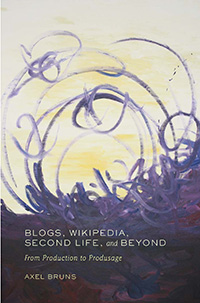You are here
Launching Produsage.org
As I write this, the launch of Blogs, Wikipedia, Second Life, and Beyond: From Production to Produsage may still be a couple of months away, but Produsage.org is already up and running. This is a space to collect thoughts, comments, and research related to the growing phenomenon of user-led content creation across such a large range of intellectual domains - a phenomenon which I've attempted to define as produsage. For the moment, I'm necessarily still the main proponent of this concept, but I hope that, in time, many more voices will join in as we celebrate and critique developments towards a wider acceptance both of the term, and of the produsage model itself - so, welcome, and please consider making your own contributions to this site.
But let me start at the beginning: why 'produsage'?
My suggestion of this term builds on a simple, yet fundamental proposition: the proposition that to describe the creative, collaborative, and ad hoc engagement with content for which user-led spaces such as the Wikipedia act as examples, the term 'production' is no longer accurate. This is true even where we re-imagine the concept of production as user-led production, commons-based peer production, or more prosaicly as the production of customer-made products: not the adjectives and qualifiers which we may attach to the term production are the problem, but the very noun itself.
Users who participate in the development of open source software, in the collaborative extension and editing of the Wikipedia, in the communal world-building of Second Life, or processes of massively parallelised and decentralised creativity and innovation in myriads of enthusiast communities do no longer produce content, ideas, and knowledge in a way that resembles traditional, industrial modes of production; the outcomes of their work similarly retain only few of the features of conventional products, even though frequently they are able to substitute for the outputs of commercial production processes. User-led content production is instead built on iterative, evolutionary development models in which often very large communities of participants make a number of usually very small, incremental changes to the established knowledge base, thereby enabling a gradual improvement in quality which - under the right conditions - can nonetheless outpace the speed of product development in the conventional, industrial model.
Such modes of content creation - involving large communities of users, who act without an all-controlling, coordinating hierarchy - operate along lines which are fluid, flexible, heterarchical, and organised ad hoc as required by the ongoing process of development; they are more closely aligned with the emergent organisational principles in social communities than with the predetermined, supposedly optimised rigid structures of governance in the corporate sphere. User-led content creation in this new model harnesses the collected, collective intelligence of all participants, and manages - though in some cases better than in others - to direct their contributions to where they are best able to make a positive impact.
To overcome the terminological dilemma which faces us as we attempt to examine processes of user-led content creation, we must introduce new terms into the debate. The concept of produsage is such a term: it highlights that within the communities which engage in the collaborative creation and extension of information and knowledge that we examine on this site, the role of consumer and even that of end user have long disappeared, and the distinctions between producers and users of content have faded into comparative insignificance. In many of the spaces we encounter here, users are always already necessarily also producers of the shared knowledge base, regardless of whether they are aware of this role - they have become a new, hybrid, produser.
Everything else follows from this proposition. This site, and the book which it accompanies, outlines the idea of produsage in greater detail, and aims to explore the wealth of research and development now underway in the field. Again, welcome, and enjoy the ride...
Getting Started:
- Snurb's blog
- Log in to post comments
- 5617 reads
 Printer-friendly version
Printer-friendly version


